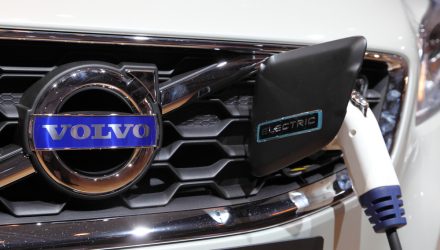Volvo and Starbucks have announced a partnership that will see a buildout of EV charging stations at Starbucks along a major highway between Seattle and Denver, reports Newsweek. It’s the first such partnership of public EV charging for Starbucks, a chain that has over 15,000 stores in total in the U.S.
The combination coffee shop and charging stations will be created along a 1,350-mile stretch of highway and will be built every 100 miles, a distance that is “well within the battery range of most electric vehicles,” according to Volvo.
Volvo offers seven plug-in EV models, two entirely electric and the rest of them plug-in hybrids that all recently received an upgrade that allows for greater range. The C40 Recharge, one of the all-electric vehicles, can go 226 miles on a single charge and is able to go from 20%-90% charge in just 40 minutes on a DC fast charger, weather and battery conditions permitting.
The EV stations will be open to all, but owners of Volvo’s Recharge models will receive either preferential rates or else no charge, to be determined at a later date.
“All indications are so far that EV owners will do most of their charging at home, and only charge on the road as needed. But exactly how and where to place on-the-go chargers is more art than science, especially as EVs accounted for only about 3% of US registrations in 2021, meaning that there isn’t yet critical demand in most areas enough for EV chargers to yet be a profitable business,” said Stephanie Brinley, principal analyst, S&P Global Mobility, in an interview with Newsweek.
Capturing the Predicted Growth for EVs With KARS
The buildout of the EV infrastructure and the innovation that Volvo is demonstrating in incorporating options in a way that would be most appealing to consumers are both part of efforts to preemptively capture the expected growth of EV demand globally and in the U.S.
For investors looking to capture that growth, the KraneShares Electric Vehicles and Future Mobility ETF (NYSE: KARS) offers a good solution.
KARS invests in many familiar car companies such as Volvo, Tesla, Ford, Mercedes-Benz, GM, BMW, and others, as well as major Chinese EV manufacturers such as Xpeng, Nio, and BYD, some of the biggest companies in the global electric vehicle industry.
KARS measures the performance of the Bloomberg Electric Vehicles Index, which tracks the industry holistically, including exposure to electric vehicle manufacturers, electric vehicle components, batteries, hydrogen fuel cells, and the raw materials utilized in the synthesis of producing parts for electric vehicles.
The index has strict qualification criteria. Companies must be part of the Bloomberg World Equity Aggregate Index, have a minimum free-float market cap of $500 million, and have a 90-day average daily traded value of $5 million.
The ETF has an expense ratio of 0.70%.
For more news, information, and strategy, visit the Climate Insights Channel.

